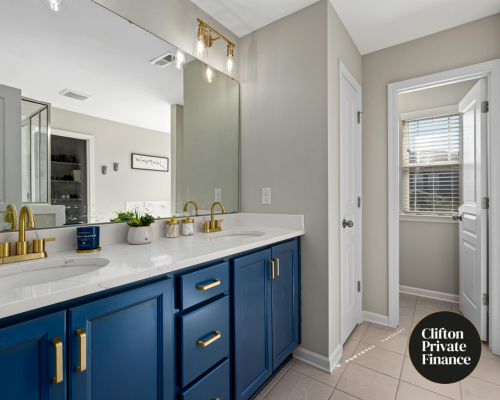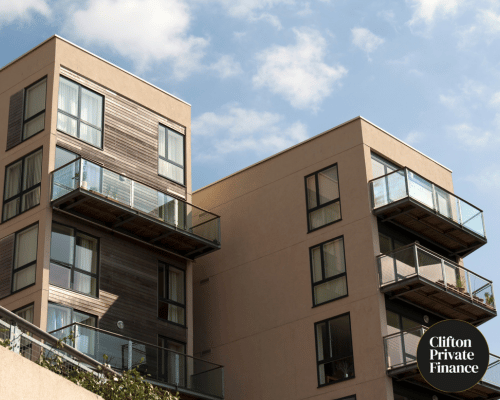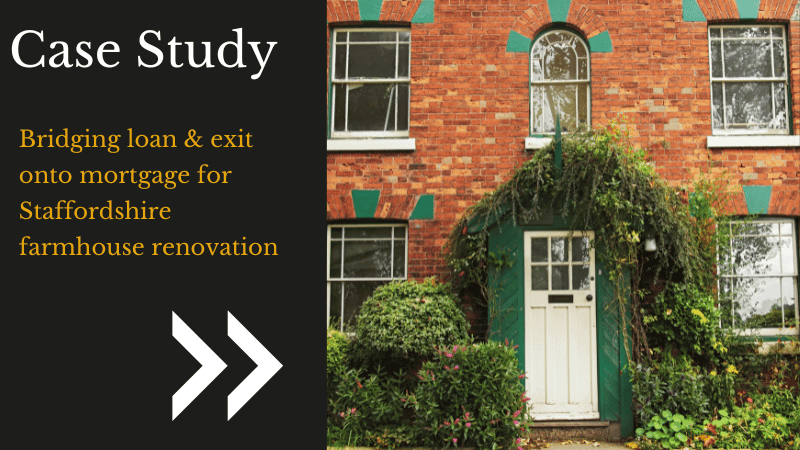Categories
Converting a House into Flats - Finance Options & More

In the current UK property and rental market there’s a strong argument for converting larger houses into smaller separate homes in the form of flats.
Compare Funding Options
So, whether you plan to undertake a conversion project to then sell on for a profit, or to be a landlord and retain the property as an investment going forward, it’s a socially-conscious thing to do with comprehensive support from the financial sector.
At Clifton Private Finance, we have the expertise needed to help you fund your property conversion. Our team can discuss the different financial options for you and help you select the ones that are best for your project.
Starting a House-to-Flats Conversion Project
When you convert a house into multiple flats, you typically increase the overall value of the property - both in terms of resale and as an investment. Landlords with multiple flats enjoy greater flexibility, higher rental yield, and greater demand as the smaller properties are more affordable. Owners looking to gain profit from a sale also benefit from the demand and flexibility, with multiple flats often reaching a combined value far in excess of a single larger home.
There are typically two starting points when converting a house into flats:

You already own a large house and are ready to split it into flats.

You are buying a property specifically for conversion, possibly at an auction to maximise potential profit
In both cases, getting the finance in place is essential.The right funding will make or break the project and working with a specialist finance broker is an important step that ensures the project runs smoothly.
Planning for a Flat Conversion
You can’t just put in a few doors and take a hammer to a couple of walls! Undertaking a house-to-flat conversion in the UK means you must follow the relevant regulations. This means taking into consideration:
- Planning permission - This is required in most cases, as the changes you are making to the property are significant. Make sure you look into the planning limitations well in advance of the project. This may include a period where local residents are informed of your plans and given the chance to respond and object. Planning permission should never be overlooked - if you go ahead with your conversion without the appropriate permission, you can later be legally forced to return the property to its original state, a costly mistake.
- Building regulations - The building must meet all UK standards and regulations. This means several things, including fire safety and escape corridors, appropriate soundproofing and insulation between flats, and the need for the services, such as electricity and gas, to be separated for individual occupants. Like planning permission, it’s important to understand the regulations far in advance of taking action.
- Access, parking, and other practical considerations - If you are converting the house into flats, you will need to think about how each new resident reaches their property. More people living there means more cars, especially as they will be from different families. Even things like where to put the bins (and how many bins you need) will make an impact during your planning stage.
- Freehold vs. leasehold - Deciding how you structure the leases on the flats is important and the decisions made at this early stage will affect the final funding options available to you.
- Limited company setup - If you plan to retain the property after its conversion and act as a landlord with a portfolio of flats then it is worth considering setting up the structure as a limited company to improve your tax obligations. To learn more about how limited company structures differ from being a landlord as a private individual, read our in-depth article.
Budgeting for the Project
Realistic budgeting and financial forecasts are absolutely essential before moving forward with your flat conversion project.
Stereotypically, these construction projects are often shown to have budgets that spiral out of control, and while that’s perhaps an overdramatic presentation that’s good for engaging television, the stereotype does exist for a reason. Poorly planned and managed, a house-to-flat conversion can struggle with many hidden costs that cut into profits and heighten anxiety.
This will not only improve the chances of your funding being approved, but may result in lower interest rates and a greater profit margin throughout.
Your budget should include:
- The cost of construction
- Professional fees, such as those for the architect, surveyor, and legal costs
- Specialist infrastructure requirements, such as separating utilities
- Personal costs, for example to cover living expenses if taking time from your usual work
- Margin for unforeseen costs and delays
The 4 Finance Options for Converting a House into Flats
There is rarely a ‘one size fits all’ funding solution for projects of this complexity.
Trying to force a single finance product to cover all eventualities can lead to additional costs, such as unnecessary or inflated interest rates, or unwanted fees. In some cases, a funding option that’s useful for one stage of the project may be prevented through regulation to be used for another.
Compare Funding Options
Some of the major finance products used include:

Remortgages
If you already own the property and there is an existing mortgage placed upon it, then a remortgage is the first option to consider. A remortgage is a complete refinancing solution, which leverages the equity you have in the property to provide substantial levels of capital. A remortgage will:
- Pay off the existing mortgage in full, replacing it as the most senior debt on your property
- Provide the opportunity to improve your interest rates based on the current market
- Offer lower rates than most other loans
- Present a long-term finance repayment structure that keeps monthly repayments as low as possible
- Unlock the equity gained in your property, using the value of the house to fund the conversion
- Give flexible terms that can be revisited a few years later if either your financial profile or the market improves
With established relationships with the wide range of UK mortgage lenders, Clifton Private Finance are perfectly placed to help you get a mortgage that best fits your personal circumstances. We will work with specialist lenders who understand your conversion plan and your financial situation to offer a mortgage product that is tailored for your needs.
A remortgage is always essential if you are moving from owning the building as a residence, with a residential mortgage attached to it, to becoming a landlord. You will need to convert the mortgage to a buy-to-let structure which is a remortgage in itself.

Bridging Loans
A bridging loan is a short-term solution that can provide significant funding for house-to-flat conversions. Bridging loans are structured with a full repayment at the end of a defined term thanks to an exit strategy. This is typically either:
- Refinancing to repay the bridging loan - A mortgage would be obtained to pay off the bridging loan, replacing the short-term financing with a long-term repayment option.
- Selling the property - Once converted, the flats are sold to pay off the bridging loan and provide profit.
Bridging loans have two key advantages over longer-term options, like mortgages:
- Speed of application - A bridging loan can be obtained far quicker than a mortgage, with fewer checks for long-term stability and a focus on the exit strategy to provide risk mitigation. This means bridging loans are excellent for making auction property and other purchases that offer below-market value sales for expediency.
- Perfect for renovations - Mortgages have far more stringent criteria when evaluating the property and are difficult to secure if the house is in need of significant renovation. If buying a property with the idea of ‘doing it up’ as part of the house-to-flat conversion, a bridging loan will provide the capital for the renovations and can be replaced later with a mortgage once the property fulfils the stricter limitations.
Recent Case Studies
Get started with our calculator
Development Finance
Development finance provides a structured middle ground between bridging loans and long-term mortgage options. Like a bridging loan it is an interest-only finance option that’s designed to be repaid in full by the sale of the property or refinancing, but with a different structure that can make it cheaper for more complicated property works.
Development finance is specialist property finance designed expressly for this purpose. It offers funding for both the purchase and ongoing redevelopment plan, making it ideal for larger-scale projects, such as buying a property with the intent of turning the house into three or four individual flats.
Clifton Private Finance work with the wide UK marketplace of lenders and have established relationships with specialist development finance providers. By working in partnership with us, you will be able to secure a tailored development finance product for your project.
Second-Charge Mortgages and Homeowner Secured Loans
A second-charge mortgage or homeowner loan is a finance product that is secured on your property but doesn’t replace the existing mortgage, leveraging equity to provide capital without requiring a remortgage. It has several advantages and disadvantages, including:
- PRO: Faster application process than remortgage
- PRO: Shorter term repayment structure
- PRO: Able to leverage property equity without displacing existing mortgage finance
- PRO: Good to pay for smaller renovations and conversion projects
- PRO: Avoids early repayment charges and loss of low mortgage rates
- CON: Higher interest rate than a mortgage
- CON: Limited funding available
- CON: Larger monthly repayments
If the equity in your property is significant, it may be that a second-charge mortgage is the perfect and easy answer for converting your house into flats.
Speaking to a specialist advisor will help you understand the specific pros and cons of a homeowner secured loan to determine if it’s right for your project.
Timing Your Finance
Construction projects can become quite costly if finance is poorly managed. Ensuring you have the right about of money in place at each stage can be complicated, especially if you are relying on multiple finance solutions to form an overall package of funding.
By working with Clifton Private Finance, you gain the advantage of an expert helping oversee the finance. We will help by:
- Negotiating with lenders to ensure interest and fees are as low as possible.
- Making sure funding is in place for any needed property purchase.
- Developing a staged funding plan that provides capital as-and-when needed rather than leaving a lump sum sitting unused while generating unwanted interest.
- Working with you on a comprehensive budget that keeps costs under control.
- Creating exit strategies and refinancing options to replace bridging finance when possible to lower costs and enhance financial security.
With the right money in place at the right time, you can save thousands on your build project and move forwards without the worry of spiralling costs.
Case study: Our case study below details how we secured a bridging loan and exit for a Staffordshire farmhouse renovation
The Specialised Multi-Unit Freehold Block Mortgage
A MUFB, or multi-unit freehold building, is typically a rental property where there’s a single freehold and multiple self-contained units, each with their own entrance, kitchen, and bathroom. It is in contrast to an HMO or house in multiple occupation where areas such as kitchens and bathrooms are shared.
When you convert a house to flats with the intention to rent out those flats rather than sell them on, you typically create a MUFB.
Lenders will only offer a MUFB if the building has been properly converted according to specifications, with separate entrances and living areas, and full consideration for fire and safety regulations. It is a mortgage that is provided based on the rental yield of the entire property, allowing for additional flexibility with acceptance criteria over multiple BTL mortgages.
MUFB mortgages provide an ideal exit strategy for both bridging loans and specialist development finance, making them a common part of many developers’ finance strategies when converting a house into flats.
Selling the Flats
If you want to sell the individual flats once you have converted the house into multiple individual homes, you will need to split the deeds and create leases. This involves working with a specialist commercial development conveyancing solicitor who will have the experience you need to deal with the land registry and structure the resulting ground rent and service charge contracts.
As the final sale may form the exit strategy for your funding, it is important that it is properly considered from the early planning stages.
Getting Funding with Clifton Private Finance
Well planned, converting a house into flats can be hugely profitable - both when selling on and if wanting to rent out the different properties as a landlord.
Our specialist mortgage team will be able to link you to lenders who understand MUFB and conversion projects, giving you the best possible chance of a successful funding application.
Compare Funding Options
With an overview of comprehensive project-based and staged financing, Clifton Private Finance are here to keep fees and interest costs low. Our expertise will help you navigate the complexities of the development financing landscape to reach the right solution for you. Speak to an advisor today.
















